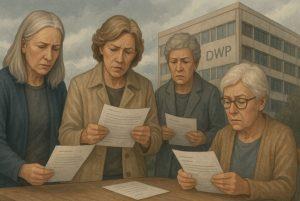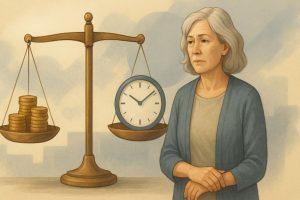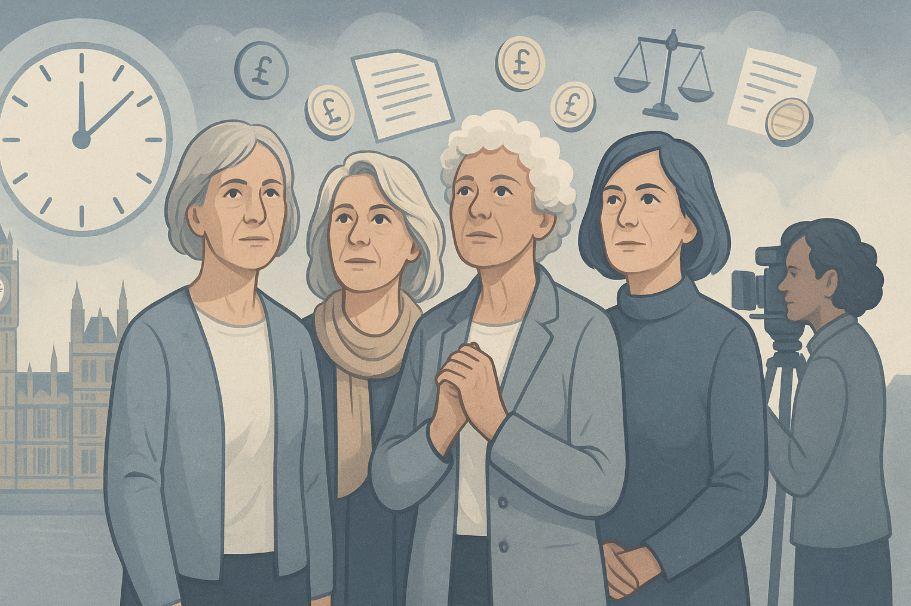The DWP WASPI pension compensation issue has become a significant topic in UK policy discussions, particularly for women born in the 1950s. These women were impacted by changes to the State Pension age, introduced without adequate notice. As pressure mounts on the government to address these failings, many are now asking how much compensation will be offered and who will qualify.
What Is the DWP WASPI Pension Compensation About?
 The Women Against State Pension Inequality (WASPI) campaign emerged as a result of significant changes to the UK State Pension age, particularly affecting women born in the 1950s.
The Women Against State Pension Inequality (WASPI) campaign emerged as a result of significant changes to the UK State Pension age, particularly affecting women born in the 1950s.
These changes, implemented by the Department for Work and Pensions (DWP), were part of a move towards pension age equalisation between men and women. However, many affected women argue they were not given adequate notice or information, leading to financial hardship and emotional distress.
The DWP WASPI pension compensation debate focuses on the lack of communication surrounding these changes, and whether affected women should now receive financial redress.
After years of lobbying and legal challenges, the campaign gained further momentum following findings by the Parliamentary and Health Service Ombudsman (PHSO), which ruled that maladministration had indeed occurred in the way the DWP handled these changes.
Why Are 1950s Women Affected by Pension Age Changes?
Women born between April 6, 1950, and April 5, 1960, are among those most directly impacted. The 1995 Pensions Act and subsequent legislation gradually increased the State Pension age from 60 to 65 for women, aligning it with that of men. These changes were further accelerated by the 2011 Pensions Act, which moved the goalposts for many women with relatively little notice.
Many of these women had planned for retirement based on receiving their State Pension at 60. The sudden shift in eligibility meant they had to wait several additional years, during which time many were without sufficient income or employment opportunities. The lack of timely and clear communication from the DWP exacerbated the issue, leaving many unprepared and financially vulnerable.
What Did the Ombudsman Say About the WASPI Case?
The Parliamentary and Health Service Ombudsman began investigating complaints regarding the DWP’s failure to communicate changes to the State Pension age. In 2021, the first stage of the PHSO’s report found that the DWP committed maladministration by failing to notify women adequately. The second stage, published in 2023, confirmed that women had suffered injustice as a result.
By 2024, the PHSO completed its investigation, concluding that many affected women experienced financial hardship, emotional distress, and reduced quality of life due to the DWP’s failures.
The Ombudsman recommended that Parliament take action, including offering a compensation scheme reflecting the impact on individual women. While the Ombudsman cannot enforce compensation, the findings placed significant pressure on the government to respond.
How Much Compensation Could WASPI Women Receive?
 Although there is no official figure yet agreed upon by Parliament or the DWP, the Ombudsman suggested compensation levels between £1,000 and £2,950, depending on the degree of harm suffered. Campaigners argue that this range is far too low, considering some women lost out on up to £50,000 in State Pension income due to the delayed age.
Although there is no official figure yet agreed upon by Parliament or the DWP, the Ombudsman suggested compensation levels between £1,000 and £2,950, depending on the degree of harm suffered. Campaigners argue that this range is far too low, considering some women lost out on up to £50,000 in State Pension income due to the delayed age.
Parliamentary debates have explored the possibility of tiered compensation based on levels of hardship experienced. The WASPI campaign itself is calling for at least £10,000 per affected woman, while some MPs are pushing for even more generous payments. The government has yet to announce a confirmed package, but a structured approach is expected.
Estimated Compensation Tiers
| Impact Level | Description | Suggested Compensation Range |
| Level 1 | Minor financial disruption | £1,000 – £1,500 |
| Level 2 | Moderate hardship, missed planning | £1,500 – £2,000 |
| Level 3 | Significant financial and emotional impact | £2,000 – £2,950 |
| Campaign Demand | Fair redress proposed by WASPI | £10,000+ |
| Maximum Loss Reported | Women who missed full pension years | Up to £50,000 |
These figures remain speculative until Parliament confirms a compensation framework, but they offer a broad view of what women might expect.
Who Is Eligible for WASPI Compensation?
Eligibility for compensation primarily applies to women born between 6 April 1950 and 5 April 1960. These individuals were most impacted by the State Pension age equalisation and the subsequent acceleration of those changes.
The key factor is not just the change itself but the lack of adequate notice, which left many unable to adapt their financial plans. Women who suffered financially or emotionally due to being uninformed or misinformed by the DWP are those most likely to qualify. There’s no official application process yet, but guidance is expected if the government approves compensation.
How Will the Compensation Be Paid Out?
The mechanics of the compensation scheme remain under discussion, but several possible methods have been outlined:
- Automatic payments to eligible women based on National Insurance records
- Application-based process, where women demonstrate the impact experienced
- Tiered or phased rollout depending on the volume of claims and funding approvals
Any payments would likely be administered via the DWP, but overseen by Parliament to ensure fairness and consistency. Campaigners stress the importance of a streamlined process that doesn’t require extensive bureaucracy, especially for older women who may struggle to navigate complex procedures.
As of late 2025, there has been no formal start date, but MPs are urging the government to finalise decisions before the next general election.
What Has the Government Said About the WASPI Compensation Plan?
 The UK government’s response has been cautious. While it has acknowledged the findings of the Ombudsman and the concerns raised in Parliament, it has not yet committed to a full compensation package. Ministers have argued that financial redress on a large scale must be balanced with public funding constraints.
The UK government’s response has been cautious. While it has acknowledged the findings of the Ombudsman and the concerns raised in Parliament, it has not yet committed to a full compensation package. Ministers have argued that financial redress on a large scale must be balanced with public funding constraints.
However, cross-party support for WASPI women continues to grow, and pressure on the government is mounting. In various parliamentary sessions throughout 2024 and 2025, MPs have highlighted the moral responsibility of the state to offer fair compensation for the hardship caused.
Government representatives have suggested that they are reviewing the Ombudsman’s recommendations, but have not indicated when a final decision will be announced.
What Are the Next Steps for Affected Women?
For those affected, staying informed is crucial. The WASPI campaign continues to issue updates and guidance via its official website and social media channels. Legal firms specialising in pension rights have also offered advice to women considering claims, particularly if the government does not offer a universal settlement.
Joining support groups, attending local MP surgeries, and participating in organised demonstrations remain effective ways to raise awareness and maintain political pressure. Additionally, women should ensure their National Insurance records are accurate, as these will likely be used to verify eligibility when compensation is rolled out.
Is the WASPI Compensation Fair?
Opinions remain divided. Supporters of the WASPI campaign argue that the suggested compensation amounts do not go nearly far enough in addressing the scale of financial loss experienced. For some women, delayed pensions forced them into poverty, caused housing instability, or led to deteriorating health due to stress.
Critics of large-scale payouts point to public budget pressures and argue that full reimbursement would cost billions. However, many believe the issue is not just financial but moral, highlighting the importance of government accountability.
The balance between justice and practicality is at the heart of the debate, and any proposed scheme will need to reflect both considerations.
How Does the WASPI Case Affect the Future of UK Pension Policy?
 The WASPI case may prove to be a watershed moment in how the UK approaches pension reform. It has exposed weaknesses in government communication and highlighted the need for greater transparency and public engagement when policy changes are made.
The WASPI case may prove to be a watershed moment in how the UK approaches pension reform. It has exposed weaknesses in government communication and highlighted the need for greater transparency and public engagement when policy changes are made.
There are increasing calls for a formalised process of impact assessments and consultation periods before future pension adjustments are implemented. Many also advocate for the appointment of an independent pensions watchdog to prevent similar injustices from recurring.
Ultimately, the case has raised fundamental questions about the state’s duty to its citizens, especially those nearing retirement.
Conclusion
While no final compensation scheme has been approved as of November 2025, progress has been made. The Ombudsman’s report has validated the claims of thousands of women, and growing political pressure may soon result in an official resolution.
Affected women can expect compensation discussions to continue into 2026, with Parliament likely to present a structured payout plan. The exact amount and method remain uncertain, but continued advocacy is crucial.
The WASPI movement represents not just a campaign for justice but a warning about how public policy should be implemented. For now, hope remains that fair and timely compensation will soon be delivered.
FAQs
What does WASPI stand for?
WASPI stands for Women Against State Pension Inequality, a campaign group formed to highlight the unfair treatment of women born in the 1950s regarding State Pension age changes.
Are all 1950s-born women eligible for compensation?
Not necessarily. Only those who were inadequately informed about the changes and suffered hardship due to this may be eligible, according to the Ombudsman’s findings.
Will I need to apply for WASPI compensation?
As of now, the government has not announced whether payments will be automatic or require applications. Further guidance is expected if compensation is approved.
What can I do now if I’m affected?
Staying updated through the WASPI campaign, contacting your MP, and ensuring your pension records are accurate are key steps to take while awaiting further announcements.
How long will compensation take to be paid?
No official timeline has been confirmed. If Parliament approves a compensation scheme, payments could begin within a year, depending on logistics.
Can I still join the WASPI campaign?
Yes. The campaign continues to welcome support and participation from new members, especially those directly affected.
How much money did women lose due to pension age changes?
Estimates vary, but some women report losing up to £50,000 in State Pension payments, depending on how long their retirement was delayed.








